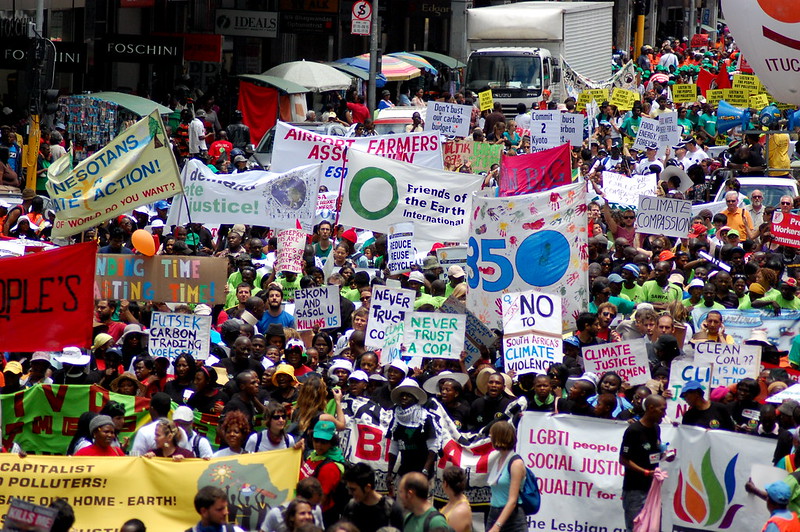LSE’s Jonathan Silver explores the challenges facing mid-sized cities such as Uganda’s third largest metropolis Mbale.
Responding to climate change is increasingly being positioned as a key dimension of urban governance. Cities are framed as sites for necessary adaptation and mitigation action over the coming decades. While significant progress is being made, such new imperatives are generating unexpected governance arrangements as they respond to the need to grapple with an indeterminate future and multiple forms of uncertainty. From the uncertainty inherent in atmospheric modelling, through to the imprecise knowledge about expected impacts, and the lack of consensus on appropriate responses, a fluid landscape of uncertainty pervades attempts to address climate change at the urban scale. Central to these shifting forms of governing climate uncertainty are issues of finance; that is, how to fund the significant transformations across urban infrastructure systems required to respond not just to today’s imperatives of poverty, sustainability and development but also to tomorrow’s carbon and climate unknowns. These have been estimated at up to $175 billion per annum in mitigation spending and up to $100 billion per annum in adaptation spending. Such large sums suggest transformation of (urban) infrastructure systems at a planetary scale are urgently required. However, flows of finance remain woefully below these estimated levels and instigate a further series of uncertainties for politicians, policy-makers and communities as to how they might realise such significant infrastructural investment.

Responses to the financing of climate change mitigation at an urban scale are partly being orientated around the promise and allure of carbon markets and instruments such as the Clean Development Mechanism (CDM). Since the Kyoto Protocol in 1997, these markets have become integral to global responses to climate change and suggest a reconfiguring of cities and capitalism more widely around the needs of decarbonisation. Yet these financial pathways for infrastructural investment remain uncertain in their effectiveness and riven by ongoing debate about whether markets can help mitigate the worst effects of climate change. As such, attempts to address climate futures predicate a cascading uncertainty across towns and cities, because as Whitington asserts, “they invite speculative anticipation of the future” based on ongoing uncertainty about measurement, use, price and longevity. The instability and speculative nature of carbon markets, in which market efficiencies are framed as the solution to global warming offering opportunities for profit, have thus provoked severe criticism in terms of the logics informing this response to climate change, and confusion in relation to urban areas securing such investment. Such an uncertain financing landscape prompts the need to reflect on the potential futures generated by travelling such carbon finance pathways.
Thinking beyond the mega-city
With over half the world’s urban population living in cities of less than 500,000 the experience of urbanisation in such urban centres may be different from the high profile mega-cities that have come to dominate visions of our urban future. In India, for instance, much of the country’s rapid urbanisation is taking place outside of the global gaze on cities such as Delhi, Mumbai and Bangalore, with estimates that 64% of the urban population is based in towns and cities of less than 1 million. These dynamics pose multiple challenges for addressing climate change imperatives within urban contexts. Thus, while high profile cities across the global South and North are enrolling in city-to-city learning networks such as C40 – through which they attempt collectively to navigate the landscapes of financial, climate and infrastructural uncertainty – smaller towns and cities remain excluded from these conversations. Although global networks and relationships might be playing an important role in navigating and negotiating financing landscapes elsewhere, actions in these “off-the-map” cities are less visible, perhaps even invisible, in these debates, flows of investment and emerging experimentation. Such cities and towns are often hindered by a lack of finance, strategic planning capabilities and access to expertise, while simultaneously facing the need to deliver basic services, address widespread poverty and emerging biophysical dynamics. They therefore occupy a tentative, undetermined position in wider discourses concerning urban mitigation. Their unfolding responses to these futures, taking place across much of the urbanised world yet often hidden from global debates, offer valuable reflections, not just for similar-sized urban areas but across a range of different urban contexts.
Mbale’s waste(d) infrastructure
Mbale, in eastern Uganda is one such town that may offer some insights into urban life beyond the mega-city. As climate change increasingly becomes part of the present, rather than future, cities scramble to secure financing to underpin responses to these uncertain landscapes. While Mbale is the third largest urban area in the country, with a population of around 100,000 living under the shadow of Mt Elgon, it remains outside the current global and regional debates about climate change, barely registering on maps of learning, knowledge exchange and production, and peripheral to attempts to urbanise the climate change agenda. Furthermore, with limited local government financing and a series of ongoing development issues – including often abysmal roads, slums without basic sanitation or water networks and outbreaks of disease such as cholera – Mbale faces multiple uncertainties as its aspires to city designation and regaining its historic status as ‘the cleanest town in East Africa’.
Recent investments in a waste management project place Mbale at the forefront of experiments in carbon financing that present opportunities to address a series of wider urban imperatives. As it joins other Ugandan towns and cities in a new form of infrastructure investment aimed at addressing waste issues in the town, mitigating Green House Gases (GHG) and generating ongoing financing through the CDM (Clean Development Mechanism), Mbale is in many ways at the forefront of questions about how urban authorities navigate multiple forms of climate-driven future uncertainty and generates a cautionary pause for thought about the direction in which towns and cities may be travelling.
On the surface the Uganda Municipal Waste to Compost Program appears to offer the best of all worlds. The municipality is provided with an opportunity to upgrade its waste infrastructure through the development of new ways in dealing with the management of this urban metabolism. This is predicated on the collection of waste at 25 points across Mbale on a regular basis, with the waste being taken to a nearby facility and transformed into compost rather than the GHG methane that would be emitted if the waste was just dumped. Such waste infrastructure should help to manage the piles of rubbish, often named after local politicians by frustrated residents, perhaps even help Mbale regain its reputation as a clean (or even the cleanest) town, together with addressing the health and poverty issues that emerge from its inability to process up to 100 tonnes a day of waste. The transformation of waste into compost would seemingly add value to Mbale’s rubbish, and, crucially, stop methane emissions from leaving the waste site. Furthermore, these savings, converted into so called ‘carbon credits’ could be traded, via the CDM, on global carbon markets and generate a form of revenue to be reinvested in the town’s infrastructure, another apparent benefit of connecting to this form of investment.
In reality, a visit to the site reveals workers on strike and waiting for unpaid wages, no compost processing being undertaken, few deliveries of collected waste from around the town and a project that seems to have partly collapsed. Such a scene provides a visible indication that this attempt to marshal CDM financing for infrastructure investment is sadly failing. Such difficulties in implementation, but also the wider market logics of the investment that mediate its delivery, reveal the problematic nature of mobilising carbon markets to not only address mitigation but also the wider urban imperatives that are being invoked in promoting such investment.
The intervention in Mbale was designed by the World Bank and Uganda’s National Environmental Management Authority as urban Africa’s first Programme of Activities (POA) under the CDM4. The motivation for the development of POAs is to address the difficulty that towns and cities such as those in sub-Saharan Africa have in accessing financing through carbon markets by including replicable projects with low and distributed GHG reductions into the CDM. Yet, from the very start, the competing logics of seeking to address mitigation objectives with the transformation of waste collection within the context of Uganda’s under-resourced municipalities created conflicts. As the project was very much initiated by the World Bank, the emphasis on mitigation and the need to show the value of the increasingly discredited CDM shaped the parameters of the project, meaning that the main focus was not on waste management per se, (which was the priority for Mbale). Primarily, the problems in implementing the scheme concerned the ability of the under-resourced municipality to operate the scheme and to generate the revenue to keep it operational, meaning insufficient resources such as collection vehicles and resulting in piles of rubbish (if smaller than previously) characterising the urban landscape. These dynamics have caused periods of inactivity in which waste has not been collected and thus projected methane emission savings have not been attained, meaning the project now faces the reality of failing to either produce mitigation action or significantly improve waste management in Mbale. Furthermore, the displacement of former waste-pickers from the site, the failure of the contractor to pay either on time or an adequate wage for the workers and continued waste issues in informal settlements have meant that the project enfolds new uncertainties into the existing everyday uncertainties for some of Mbale’s most impoverished residents.
What begins to become clear when reflecting on Mbale’s carbon experiment is the problematic nature of markets to address the uncertainties around managing climate change. The marketisation of the atmosphere, the need to address multiple policy imperatives and the difficulties of towns and smaller cities in not just accessing but implementing this form of financial investment do not seem to offer any resolution in forging a more certain future. The over-riding logic of creating value from waste through compost and the carbon market shapes a particular form of investment in Mbale’s infrastructure; one that signals a commodified vision of climate change response which the municipal government is, due to a lack of alternative options, forced to adopt. As such, the autonomy of the municipality is severely curtailed in its attempts to find local solutions, as the World Bank seeks to explore ways to make good on the promises of an increasingly discredited carbon financing system. Here, we see how particular logics around the commodification of the atmosphere (from which the carbon markets have sprung) foreclose other potential non-market and more localised ways to address an uncertain climate future.
Carbon futures
Having to navigate the contradictions and complexities of this CDM investment and the particular agenda it embeds in local governance are not challenges Mbale is facing in isolation. Across the global North and South, towns and smaller cities are experiencing multiple forms of uncertainty concerning carbon financing as an option for funding mitigation and addressing other urban imperatives. Unable to rely on the financial options open to mega-cities (including taxation, loans, large-scale grants and so forth), towns such as Mbale remain at once hesitant, overawed and reactive to the shifting, uncertain global landscapes of carbon financing. Through the need and even desperation to welcome all types of investment, despite the potentially problematic nature of funding such as the CDM, the urban futures of places such as Mbale becomes deeply entwined with the logics and objectives of global institutions such as the World Bank rather than the concerns of communities and the agenda of local policy-makers. This is a milieu in which a speculative, commodified approach to climate change is generating new geographies of investment and forms of urban governance, yet failing to offer a more certain future.
1 World Bank
2 UN-Habitat
3 Indian Census (2001) and http://infochangeindia.org/urban-india/cityscapes/indias-small-towns-symbols-of-urban-blight.html
4 Under a programme of activities (PoA) it is possible to register the coordinated implementation of a policy, measure or goal that leads to emission reduction. Once a PoA is registered, an unlimited number of component project activities (CPAs) can be added without undergoing the complete CDM project cycle.
5 40,000 shillings a month payment to the 23 workers on site (around $15 per month and well below the official poverty line of $1 a day)






1 Comments